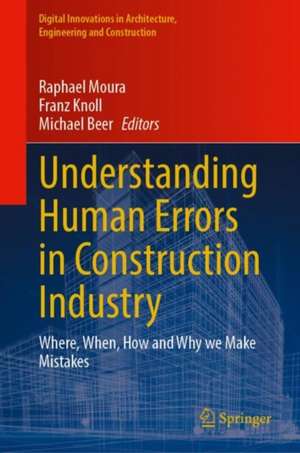Understanding Human Errors in Construction Industry: Where, When, How and Why We Make Mistakes: Digital Innovations in Architecture, Engineering and Construction
Editat de Raphael Moura, Franz Knoll, Michael Beeren Limba Engleză Hardback – 15 aug 2023
The book features a discussion of the circumstances related to error proneness, the review of some sixty mishaps or near misses from real-life construction, the systematic analysis of 238 large-scale accidents in engineering systems, the perspective of psychology on the origin of faulty human performance, and a review of the relation of management to error proneness.
Din seria Digital Innovations in Architecture, Engineering and Construction
- 18%
 Preț: 939.33 lei
Preț: 939.33 lei - 18%
 Preț: 999.14 lei
Preț: 999.14 lei - 24%
 Preț: 838.18 lei
Preț: 838.18 lei -
 Preț: 368.20 lei
Preț: 368.20 lei - 18%
 Preț: 942.63 lei
Preț: 942.63 lei - 18%
 Preț: 1240.16 lei
Preț: 1240.16 lei - 18%
 Preț: 1103.62 lei
Preț: 1103.62 lei - 18%
 Preț: 1420.88 lei
Preț: 1420.88 lei - 20%
 Preț: 1052.67 lei
Preț: 1052.67 lei - 18%
 Preț: 739.00 lei
Preț: 739.00 lei - 18%
 Preț: 896.84 lei
Preț: 896.84 lei - 18%
 Preț: 784.48 lei
Preț: 784.48 lei - 18%
 Preț: 886.75 lei
Preț: 886.75 lei - 24%
 Preț: 850.45 lei
Preț: 850.45 lei - 23%
 Preț: 762.59 lei
Preț: 762.59 lei - 20%
 Preț: 985.49 lei
Preț: 985.49 lei
Preț: 1110.72 lei
Preț vechi: 1354.54 lei
-18% Nou
Puncte Express: 1666
Preț estimativ în valută:
212.56€ • 230.81$ • 178.55£
212.56€ • 230.81$ • 178.55£
Carte tipărită la comandă
Livrare economică 22 aprilie-06 mai
Preluare comenzi: 021 569.72.76
Specificații
ISBN-13: 9783031376665
ISBN-10: 3031376668
Pagini: 216
Ilustrații: IX, 216 p. 38 illus., 16 illus. in color.
Dimensiuni: 155 x 235 mm
Greutate: 0.5 kg
Ediția:1st ed. 2023
Editura: Springer Nature Switzerland
Colecția Springer
Seria Digital Innovations in Architecture, Engineering and Construction
Locul publicării:Cham, Switzerland
ISBN-10: 3031376668
Pagini: 216
Ilustrații: IX, 216 p. 38 illus., 16 illus. in color.
Dimensiuni: 155 x 235 mm
Greutate: 0.5 kg
Ediția:1st ed. 2023
Editura: Springer Nature Switzerland
Colecția Springer
Seria Digital Innovations in Architecture, Engineering and Construction
Locul publicării:Cham, Switzerland
Cuprins
Human Errors in Engineering.- Design & Construction Case Studies.- Learning from Large-Scale Accidents.- Insights from Psychology.- Insights from Construction Management.- Evaluation of Case Studies / A Template Approach.
Notă biografică
Raphael Moura is a Regulatory Specialist and Researcher focused on the key elements of an effective safety management system at high-risk facilities, including human factors. He is Superintendent for R&D and Environment at the Brazilian National Agency for Petroleum, Natural Gas and Biofuels — ANP. Dr. Moura is also editor of the ASCE-ASME Journal of Risk and Uncertainty in Engineering Systems Part B: Mechanical Engineering. His industrial experience includes 8 years as Technician and as Engineer, designing offshore facilities for civilian and military applications.
Franz Knoll has continuously been involved in research about human errors in construction. He has been the voice of the practice, being a practical engineer himself during most of his career of more than 60 years. In his publications and lectures, he has discussed strategies and methods to limit the frequency of human errors (gross errors as recognized by Gauss) and their effect on the quality and proneness to accidents in construction work.
Franz Knoll has continuously been involved in research about human errors in construction. He has been the voice of the practice, being a practical engineer himself during most of his career of more than 60 years. In his publications and lectures, he has discussed strategies and methods to limit the frequency of human errors (gross errors as recognized by Gauss) and their effect on the quality and proneness to accidents in construction work.
Michael Beer is Professor and Head of the Institute for Risk and Reliability, Leibniz Universität Hannover, Germany. His research activity focuses on uncertainty quantification in engineering with emphasis on imprecise probabilities. He is Editor-in-Chief of the ASCE-ASME Journal of Risk and Uncertainty in Engineering Systems, Part A Civil Engineering and Part B Mechanical Engineering. He also served as Editor-in-Chief of the Encyclopedia of Earthquake Engineering (Springer 2015). He is Chairman of the European Safety and Reliability Association (ESRA) and Co-Chair of Risk and Resilience Measurements Committee (RRMC), Infrastructure Resilience Division (IRD), ASCE; he is serving on the Executive Board of the International Safety and Reliability Association (IASSAR) and on the Board of Directors of the International Association for Probabilistic Safety Assessment and Management (IAPSAM).
Textul de pe ultima copertă
This book provides an analysis of the origin and effect of human errors in engineering. Using cases from everyday construction and large-scale accidents, the circumstances associated with the creation of errors are illustrated, along with strategies for their prevention, with the goal to eventually minimize cost overruns, delays, and accidents.
The book features a discussion of the circumstances related to error proneness, the review of some sixty mishaps or near misses from real-life construction, the systematic analysis of 238 large-scale accidents in engineering systems, the perspective of psychology on the origin of faulty human performance, and a review of the relation of management to error proneness.
The book features a discussion of the circumstances related to error proneness, the review of some sixty mishaps or near misses from real-life construction, the systematic analysis of 238 large-scale accidents in engineering systems, the perspective of psychology on the origin of faulty human performance, and a review of the relation of management to error proneness.
Caracteristici
Presents a rigorous analysis of real-world construction errors using pattern recognition technology Brings together expertise from engineering, management, and psychology Combines comprehensive practical experience with deep theoretical research
